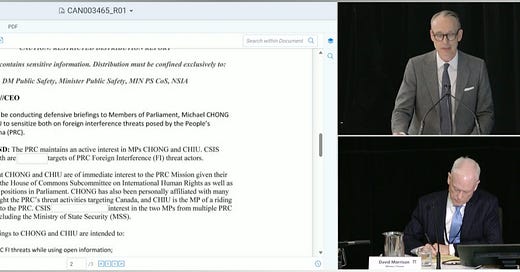Global Affairs vs. CSIS: Lawyer Calls Senior Trudeau Official's Explanations on China's Targeting of MPs "Infantile"
OTTAWA, Canada — The deep divide between Global Affairs Canada and CSIS regarding what Canadian intelligence perceives as an existential threat to Canada’s sovereignty from Beijing was brought into sharp focus Friday during tense exchanges at the Hogue Commission.
Michael Chong’s lawyer, Gib van Ert, confronted David Morrison, a senior official in Prime Minister Trudeau’s administration, about the government’s delayed response to Chinese secret police actions targeting Chong and his family.
Van Ert referenced a redacted CSIS document that identified both Chong and Kenny Chiu, Conservative MPs critical of Beijing, as targets of interference by Chinese consulate officials and China’s Ministry of State Security.
The Hogue Commission, which is investigating foreign interference in Canada, reviewed the May 2023 decision to eject Zhao Wei, a Chinese diplomat, only after a Globe and Mail report revealed Zhao’s involvement in targeting Chong.
In his testimony, Morrison, Deputy Minister at Global Affairs Canada, appeared to struggle with explaining why Ottawa delayed declaring Zhao persona non grata, while defending the decision not to share a critical CSIS intelligence assessment with Prime Minister Justin Trudeau. The assessment outlined China’s expansive plans to target and influence Canadian MPs.
Ministry of State Security Targeting of Chong’s Family
"Mr. Morrison, is it your opinion that when CSIS characterized the threat posed to Mr. Chong and his family as foreign interference, they were wrong? That it was instead legitimate diplomatic activity?" van Ert asked the Trudeau official.
Morrison avoided a direct answer, responding, "This is a complex issue. A set of documents can say multiple things about multiple people."
Van Ert pressed Morrison, highlighting a contradiction between this answer and his private interview with Commission lawyers. In that interview, Morrison had suggested that much of the intelligence he reviewed framed the Chong case as foreign interference, but in his view, “such activities were legitimate diplomacy.”
Van Ert asked pointedly, "If Zhao Wei was sending the information he was collecting about Mr. Chong and his family back to the Ministry of Foreign Affairs, there's no particular problem with that necessarily. But if Zhao was sharing that information with the Ministry of State Security in China, that would be a different matter altogether. Don't you agree?"
Morrison responded, "It may or may not."
Van Ert also cited Morrison’s earlier testimony, which suggested that China’s response to Canadian parliamentary motions, such as the Uyghur Motion introduced by MP Chong, was legitimate diplomacy.
"You formed the view that CSIS was wrong," van Ert pressed again.
The Debate Over Zhao Wei
The pair also sparred over the expulsion of Zhao Wei. While Morrison claimed Trudeau’s administration decided to make the move to get Beijing’s attention after years of failed diplomatic overtures, he admitted that the decision only gained traction after Zhao’s role was exposed in the media.
"What I understand you to be saying here is that the government of Canada knew long before—maybe years, two years before the decision—that Zhao was a foreign interference threat actor. Did the Canadian government, in your view, know that Zhao was engaged in foreign interference months, even years before the decision to declare him persona non grata?" van Ert asked.
Keep reading with a 7-day free trial
Subscribe to The Bureau to keep reading this post and get 7 days of free access to the full post archives.




